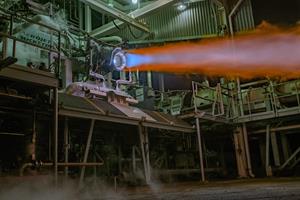- Prototype engine core made entirely of 3-D printed components
- 3-D printing delivers significant reductions in lead time and cost without sacrificing reliability
- Testing duration was more than three times that of a typical RL10 mission with multiple restarts
WEST PALM BEACH, Fla., April 08, 2019 (GLOBE NEWSWIRE) -- Aerojet Rocketdyne has successfully completed initial testing of a nearly flight-weight and production-ready configuration of its next generation RL10C-X upper-stage rocket engine that contains major components produced with the company’s industry-leading 3-D printing technology. The successful series of tests confirmed that the 3-D printed components performed as expected when integrated into a complete, full-scale engine system.
|
|||||
“We’ve made steady progress incorporating game-changing 3-D printing technology into our production engine programs to make them more affordable,” said Aerojet Rocketdyne CEO and President Eileen Drake. “By producing these components with 3-D printing, we expect to reduce lead time by 35-50%, and overall engine cost by 25-35%.”
The initial round of testing included hot firing the RL10C-X prototype engine three times the duration of a typical RL10 mission, including high mixture ratio operation and multiple engine restarts. The 3-D printed engine components and the entire engine system remain in excellent condition with significant life remaining.
Aerojet Rocketdyne has been working over the past two decades to develop 3-D printing technology, also known as additive manufacturing, to a point where components built using the technology can reliably withstand the extreme operating environment of a rocket engine that experiences high pressures and temperature gradients that range from -423°F to more than 5,000°F.
The 3-D printed components that were tested in the RL10C-X prototype make up the very core of the engine: the injector and the thrust chamber. The injector mixes the liquid hydrogen and liquid oxygen propellants and delivers them to the thrust chamber where they are burned, creating hot gases that produce thrust as they exit the engine. These components were selected because they offer the greatest cost reduction potential while delivering excellent performance and reliability.
About Aerojet Rocketdyne: Aerojet Rocketdyne, a subsidiary of Aerojet Rocketdyne Holdings, Inc. (NYSE:AJRD), is a world-recognized aerospace and defense leader that provides propulsion systems and energetics to the space, missile defense and strategic systems, and tactical systems areas, in support of domestic and international customers. For more information, visit www.Rocket.com and www.AerojetRocketdyne.com. Follow Aerojet Rocketdyne and CEO Eileen Drake on Twitter at @AerojetRdyne and @DrakeEileen.
Media Contacts:
Todd McConnell, Aerojet Rocketdyne, 561-882-5395
todd.mcconnell@rocket.com
Mary Engola, Aerojet Rocketdyne, 571-289-1371
mary.engola@rocket.com
A photo accompanying this announcement is available at http://www.globenewswire.com/NewsRoom/AttachmentNg/10747faa-a6dc-45a8-af1f-fc2ffbb22bd5
